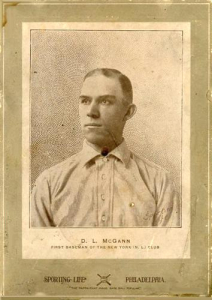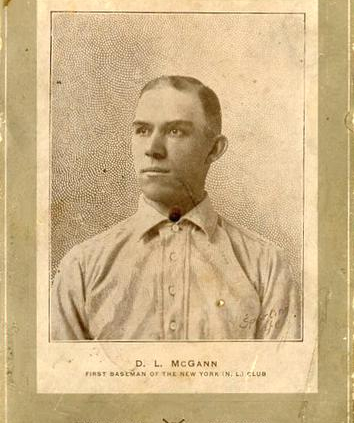Dan McGann
 Dan McGann’s career closely paralleled that of John McGraw, his teammate, friend, and drinking companion in Baltimore, St. Louis, and particularly New York, where the 6’0″, 190 lb. switch hitter was a key member of the 1904-05 Giants that McGraw considered his greatest squad. Some regarded McGann in his prime as the National League’s finest first baseman; he batted .292 and averaged 71 RBI and 29 stolen bases in his first eight full seasons, led the NL in being hit by pitches six times and in sacrifice bunts once, and placed second in total bases and on-base percentage twice, but he received even more attention for leading NL first basemen in fielding percentage six times from 1899 to 1906. As his career went into eclipse, however, the big first baseman feuded with McGraw and increasingly brooded over his family history of death and violence, eventually taking his own life in 1910 at the age of 38.
Dan McGann’s career closely paralleled that of John McGraw, his teammate, friend, and drinking companion in Baltimore, St. Louis, and particularly New York, where the 6’0″, 190 lb. switch hitter was a key member of the 1904-05 Giants that McGraw considered his greatest squad. Some regarded McGann in his prime as the National League’s finest first baseman; he batted .292 and averaged 71 RBI and 29 stolen bases in his first eight full seasons, led the NL in being hit by pitches six times and in sacrifice bunts once, and placed second in total bases and on-base percentage twice, but he received even more attention for leading NL first basemen in fielding percentage six times from 1899 to 1906. As his career went into eclipse, however, the big first baseman feuded with McGraw and increasingly brooded over his family history of death and violence, eventually taking his own life in 1910 at the age of 38.
Dennis Lawrence McGann was born in Shelbyville, Kentucky, on July 15, 1871. He began his career in professional baseball with his hometown team in the Bluegrass League in 1891. In subsequent years he went on to that league’s Harrodsville club, as well as to Lexington and Marysville, both of the Kentucky League. McGann spent the 1895 season with Norfolk-Portsmouth of the Virginia League, playing everywhere except pitcher, catcher, and first base, the position at which he eventually won fame. The following year he returned to the Virginia League as Lynchburg’s second baseman and put together a tremendous season, batting .346 with 14 home runs and 30 stolen bases in 86 games. When second-baseman Bobby Lowe went down with an injury, the Boston Beaneaters purchased McGann’s contract in August. The 25-year-old rookie batted .322 with power but committed 21 errors in 43 games.
McGann earned a second chance at the National League after switching to first base and batting .354 with an Eastern League-leading 20 triples for Toronto in 1897. Joining the legendary Baltimore Orioles, who were coming off a second-place finish after three consecutive NL pennants, Dan replaced Jack Doyle at first base and batted .301 with a career-high 106 RBI, the league’s fifth-highest total. In 1899 he became one of many Orioles to transfer from Baltimore to Brooklyn, but he batted just .243 over the first half of the season and the Bridegrooms sent him to the Washington Nationals to make room at first base for Hughie Jennings, whose injured arm prevented him from playing his usual position at shortstop. McGann bounced back to bat .343 for the second half, but after the season the soon-to-be-contracted Nationals sold him and pitcher Gus Weyhing to the St. Louis Cardinals.
In St. Louis McGann was reunited with McGraw. After a pair of solid seasons with the Cardinals, the line drive-hitting first baseman jumped in 1902 to the Baltimore Orioles of the American League, where his former teammate on the old Orioles was serving his second year as player-manager. In July McGraw, feuding with AL president Ban Johnson, jumped to the New York Giants. McGann followed him. In a fateful move, McGraw installed the big veteran at first base and moved Christy Mathewson, the incumbent at that position, permanently to pitcher. McGann won the first of four consecutive NL fielding titles in 1903 and finished the season with 36 stolen bases. The following year he tied for fourth in the NL with 42 steals. On May 27, 1904, McGann became the first player to steal five bases in a single game—a feat not matched in the NL until Davey Lopes did it for the Los Angeles Dodgers in 1974 and not surpassed until Atlanta’s Otis Nixon swiped six in 1991.
McGann helped McGraw bring to the Giants the rowdy brand of play for which the old Orioles had been famous. Characteristic was a brawl the big first baseman provoked during a 10-2 victory over the Phillies in April 1905. After McGann, trying to score from second on a hit, was thrown out at the plate by outfielder Sherry Magee, he punched catcher Fred Abbott, who responded by hitting McGann in the back with the ball. The umpire ejected both players. A few days later there was more hooliganism after a Phillies-Giants game. “How long will the National League stand for the hoodlum tactics of this New York team both on and off the field?” railed one Philadelphia newspaper. “During a game McGraw and his men are fighting umpires all the time, questioning every decision against them and resorting to all the dirty tactics known to baseball in order to win. McGraw and his crowd are intolerable during a game to all decent, self-respecting people in the stands.” Hoodlum or not, McGann batted .299 that year with 14 triples as the Giants won their second consecutive NL pennant. In that year’s World Series he batted only .235, but in Game Three he drove in four runs on three hits as New York defeated Connie Mack‘s Athletics.
In 1907 a pitch by Cincinnati’s Andy Coakley broke McGann’s wrist during spring training. When the veteran first baseman returned to the Giants in mid-season, he was out of shape and his relationship with McGraw became strained even though he finished the season with a .298 batting average. That winter McGraw traded him to Boston in a blockbuster eight-player deal that brought first-sacker Fred Tenney to New York. When a reporter pointed out that Tenney, like McGann, was 36 years old, McGraw said that Tenney had taken better care of himself.
In 1908 McGann played 135 games for Boston and slumped to .240 with only eight doubles and nine stolen bases. During a game against the Giants in May he grounded into a ninth-inning double play to end a rally. As McGann ran toward first base, McGraw called him a “damned ice wagon!”—a vehicle known for its lack of speed. “That’s how the Giants lost a lot of games last season,” the Giants manager told reporters after the game, noting that there was no one left on his club who wouldn’t have been safe at first. Hearing of McGraw’s criticism, McGann went to the Copley Square Hotel, where the Giants were staying, and threw a punch at the Giants manager as he played a game of billiards. After Mathewson failed to separate the two combatants, McGraw dashed to his upstairs room, with McGann in hot pursuit, and locked himself in. Boston released the first baseman after the season.
McGann spent the next two seasons with Milwaukee of the American Association. One commentator called him “perhaps the best known of the men who have sought a refuge in the minor leagues after a thrilling career on the diamonds of the big circuits,” but his hitting continued to deteriorate, with his batting average shrinking to a career-low .225 in 1910. According to one report, McGann intended to play for Oakland of the Pacific Coast League in 1911. According to another, he was planning to play for Louisville, near his home in Shelbyville, Kentucky, where he’d accumulated significant real estate and financial holdings.
On the night of December 13, 1910, McGann was found dead in his room in Besler’s Hotel in Louisville, with a bullet in his chest and a revolver in his hand. The coroner ruled his death a suicide. Indeed, McGann was said to be preoccupied with the tragic deaths of several close family members. In 1909 one of his brothers had taken his own life. The previous New Year’s Eve, another brother had died due to an infection resulting from an accidental shooting. McGann’s sister committed suicide in 1890 following the death of their mother. Despite that unfortunate family history, McGann’s two surviving sisters believed that he’d been murdered. Missing from his hand was a diamond ring worth $800, which witnesses had noticed McGann wearing when he was last seen alive, but a diamond pin, $37 in cash, and a $1,000 promissory note were still on his body when it was found.
Note: A slightly different version of this biography appeared in Tom Simon, ed., Deadball Stars of the National League (Washington, D.C.: Brassey’s, Inc., 2004).
Sources
For this biography, the author used a number of contemporary sources, especially those found in the subject’s file at the National Baseball Hall of Fame Library.
Full Name
Dennis Lawrence McGann
Born
July 15, 1871 at Shelbyville, KY (USA)
Died
December 13, 1910 at Louisville, KY (USA)
If you can help us improve this player’s biography, contact us.


